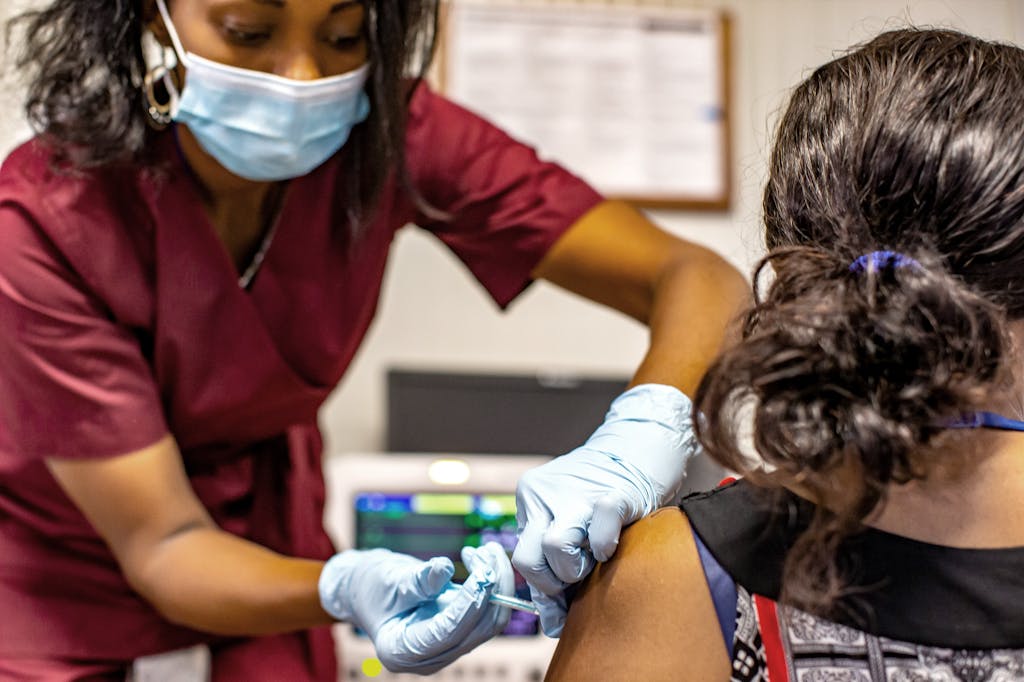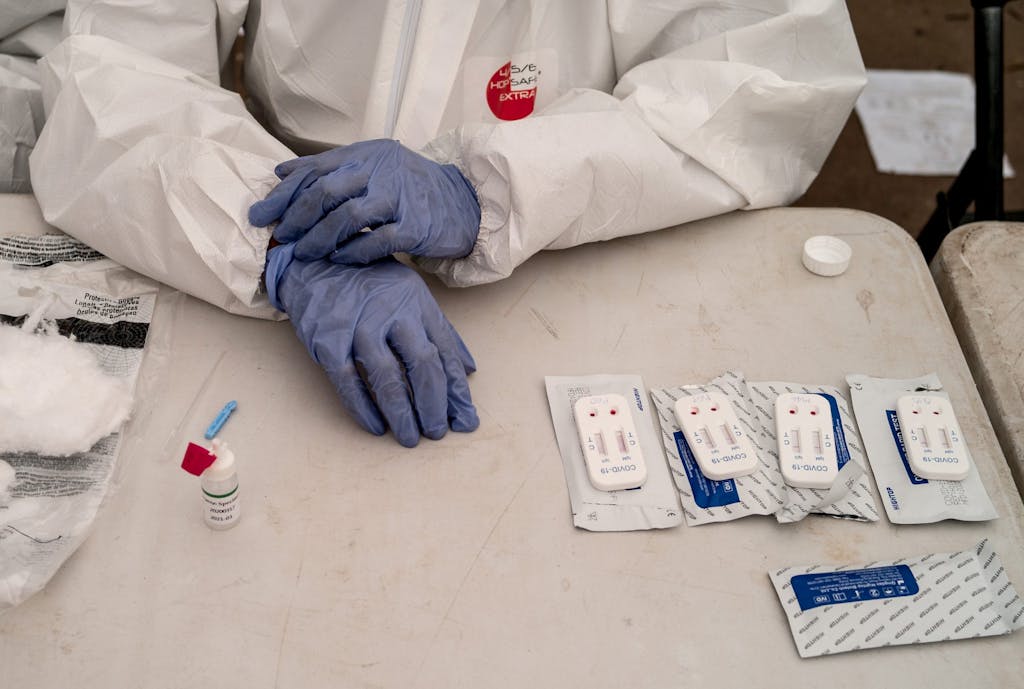Two and a half years after its launch, the Access to COVID-19 Tools Accelerator is transitioning to a more enduring, integrated system of support for procurement and distribution of COVID-19 commodities. A newly published independent evaluation makes recommendations that must be considered during this process to ensure that the world is better prepared to efficiently and equitably respond to future pandemics.
As the world descended into disorder and needs soared during the early days of the COVID-19 pandemic, major global health players came together and found a way to fast-track the development and equitable distribution of new COVID-19 tests, treatments, and vaccines. By April 2020, just a few months after COVID-19 was declared a public health emergency of international concern by the World Health Organization (WHO), the Access to COVID-19 Tools (ACT) Accelerator was launched.
The ACT-A’s mission was daunting: accelerate equitable global access to the kind of novel tools — new tests, treatments, and vaccines — that would be needed to defeat the pandemic and save lives, while also bridging the gap between rich and poor countries. Coordinated by WHO and bolstered by a strong base of core partners, the ACT-A partnership’s unprecedented collaboration enabled global access to pandemic countermeasures in record time.
In its first year, the ACT-A agencies and partners enabled the research, development, and distribution of accurate and affordable tests, treatments, 12 vaccine candidates, and personal protective equipment for front-line health workers. The impact was significant: The ACT-A supplied 80% of tests used in Africa in the first year of the pandemic. And to date, ACT-A agencies have delivered more than 1.8 billion vaccine doses to 143 countries, representing 75% of the vaccines deployed in low-income countries and the majority of vaccine doses supplied to the African continent.
The UN Foundation is proud to have played a part in the ACT-A’s success — including by bolstering staff capacity for the ACT-A Hub secretariat based at WHO — which ultimately raised $23.5 billion for the global COVID-19 response.

A healthcare worker gives an injection as part of the vaccination campaign against Covid-19 in Mali.
Photo: UN / Harandane Dicko
Learning from the ACT-A to Better Prepare for Future Threats
While the ACT-Accelerator shaped the research and development (R&D) market and expanded low- and middle-income countries’ access to COVID-19 countermeasures, it was a time-bound solution to a permanent challenge, one that merits constructive review and evaluation to ensure that the world is better protected against future threats.
In preparation for the ACT-A’s transition, in the spring of 2022 the ACT-A Facilitation Council — a group of governments and civil society, led by South Africa and Norway, set up to oversee the partnership — commissioned an independent external evaluation of the ACT-A. The final report from the evaluation, released in October, recommends the following actions for improving pandemic preparedness:
- Step up coordination and investment in R&D. The global fight against COVID-19 benefited greatly from huge scientific advances in R&D for medical countermeasures, especially regarding the development of novel vaccines, which were introduced under emergency-use listing less than a year after the virus was detected. To ensure that novel diagnostics and therapeutics benefit from the same kind of institutional muscle that the Coalition for Epidemic Preparedness Innovations and Gavi, the Vaccine Alliance, brought to vaccines, the evaluation recommends establishing three permanent R&D structures for each product type — vaccines, therapeutics, and diagnostics — geared toward pathogens of pandemic potential, as well as a joint platform to coordinate scientific exchange, technology transfer, and intellectual property management.
- Diversify manufacturing of countermeasures and enable rapid access to scaled funding for procurement for poorest countries. High-income countries and pharmaceutical manufacturers entered into rapid, high-volume purchase agreements early in the pandemic, which prevented poor countries and ACT-A partners from acquiring vaccines until after those high-income country agreements were fulfilled. To correct this injustice and enable greater purchasing power for the poorest countries, the evaluation recommends establishing an Advance Commitment Facility, with a credit line that makes funding available immediately upon identification of a pandemic threat. The evaluation also notes the importance of technology transfer, diversified manufacturing capacity, rapid prequalification, and data collection for the rapid and efficient development and rollout of tools.
- Create a more inclusive partnership for decision making. The ACT-A’s governance evolved and grew more structured as the partnership came into formation in 2020. The evaluation recommends ensuring a more inclusive partnership from Day 1, most significantly by increasing representation of low- and middle-income countries and civil society in decision making.
- Accelerate efforts to strengthen countries’ health systems. Resilient health systems, especially primary care, are fundamental to enhancing countries’ preparedness for health threats and to delivering essential service and novel countermeasures in times of crisis. Between crises, efforts must accelerate to enhance both quality and access to care.

With Madagascar’s health system under strain from the COVID-19 pandemic and schools shuttered for the foreseeable future, the health, education, and overall wellbeing of the Malagasy people are increasingly at risk. As the pandemic hits more and more countries, the World Bank Group and other organizations are stepping up to provide immediate support in order to quickly get resources to the front lines of fighting this disease. Photo: World Bank / Henitsoa Rafalia
The ACT-A Transition and Preparation for the Future
The fight against COVID-19 is far from over, yet the intensity of the past few years has faded. Countries are ready to transition to long-term integration of COVID-19 countermeasures into routine systems. Over the next six months, the ACT-A will facilitate this transition while still supporting countries’ efforts to reach the most vulnerable populations.
The pathway to safeguarding against future pandemic threats is long and complex. There is broad agreement on the need for a dedicated, sustainably financed platform for sharing medical countermeasures anchored in multilateral cooperation. However, without the urgency of an emerging global pandemic to drive this collaboration, momentum is waning and many experts are skeptical that countries will put aside their self-interests in favor of the global good.
Tackling that self-interest head-on is hard and is arguably one of the biggest failures of the past two years. As Mike Ryan, Executive Director of WHO’s Health Emergencies Program, recently pointed out about the ACT-A’s vaccine arm, known as COVAX, “Every failure that happened in COVAX happened because countries did not want to share, not because COVAX was badly designed.” In fact, if the equitable access mission of ACT-A had been fully realized 295.8 million infections and 1.3 million deaths worldwide could have been avoided by the end of 2021.
Among other solutions, WHO Member States are in preliminary negotiations regarding the development of a new international legal agreement or accord on pandemics. However, Member States have not yet agreed on how best to achieve equity goals, such as by regulating intellectual property and transferring technology and know-how.
The discussion on a new legal instrument for pandemics will continue throughout 2023. In the meantime, other initiatives are forming that will attempt to advance the lessons from the ACT-A. Among them are the G7’s 100 Day Mission partnership to accelerate R&D for novel countermeasures and WHO’s BioHub and mRNA vaccine technology transfer hub to ensure more ready access to key technology and data that will allow diversified manufacturing to flourish.
But without more sustained energy and commitment to turning lessons from this pandemic into enduring solutions, the status quo will persist. And that, tragically, would put real lives at risk when the next pandemic strikes.




